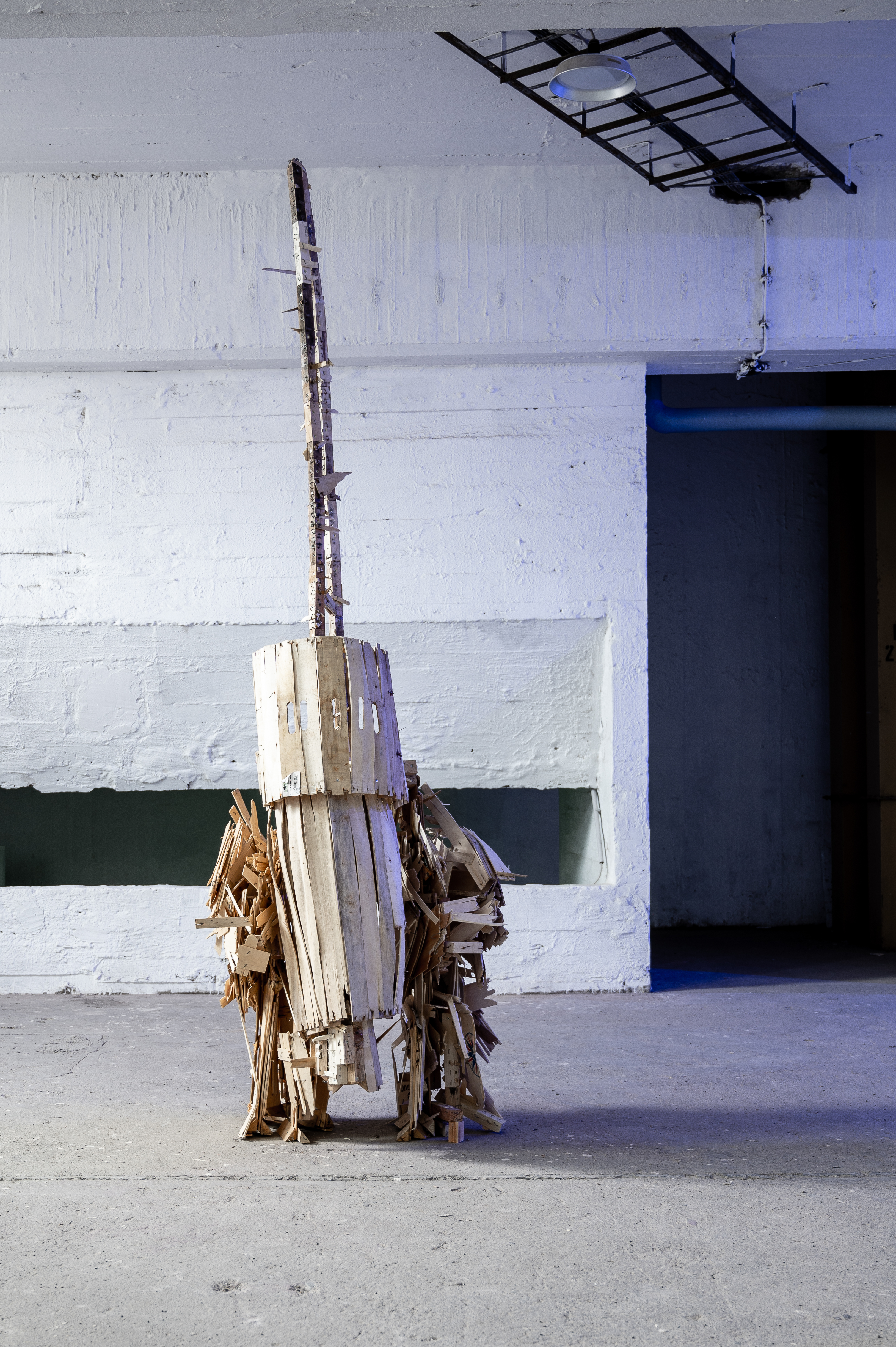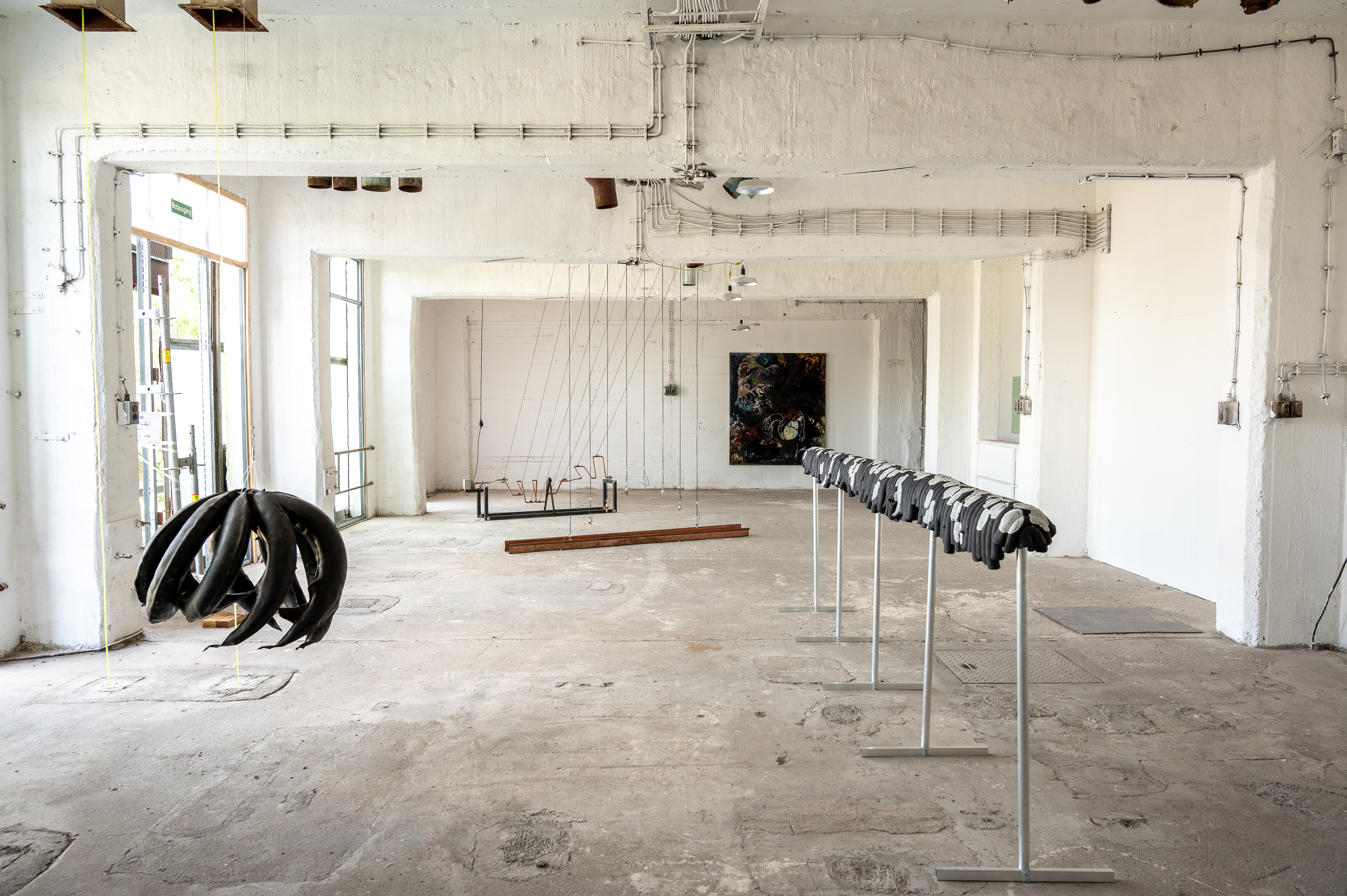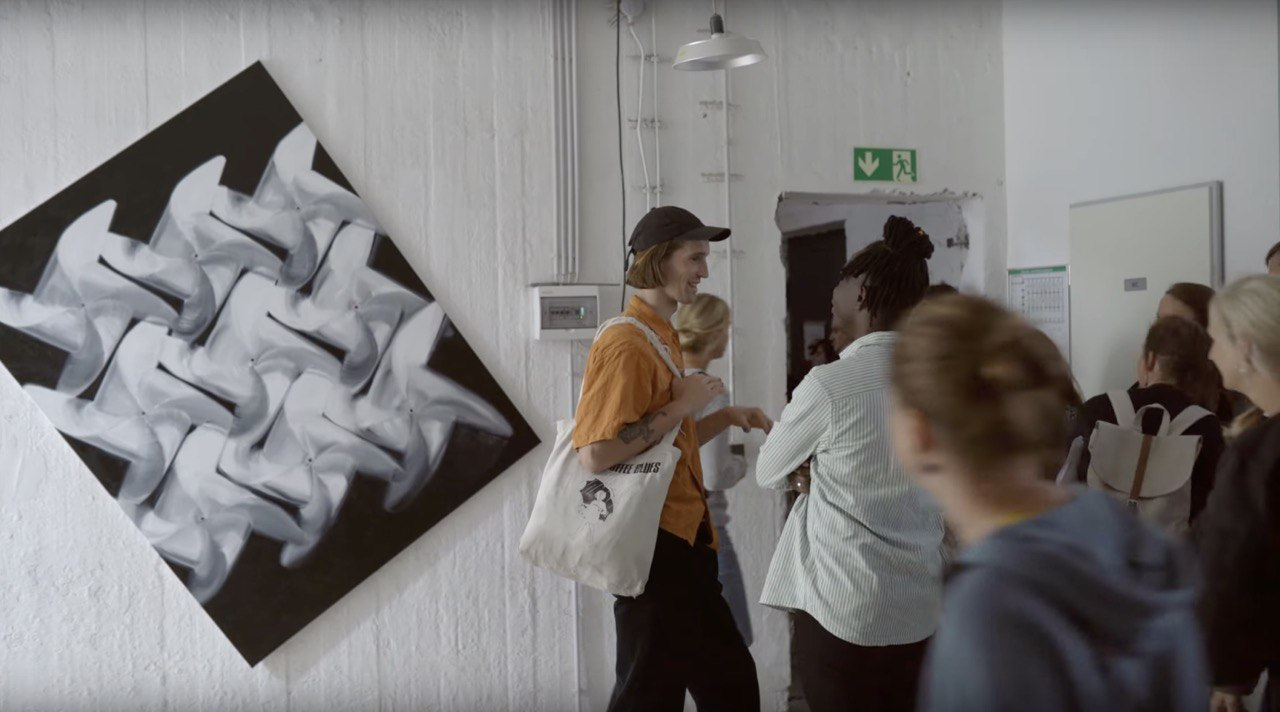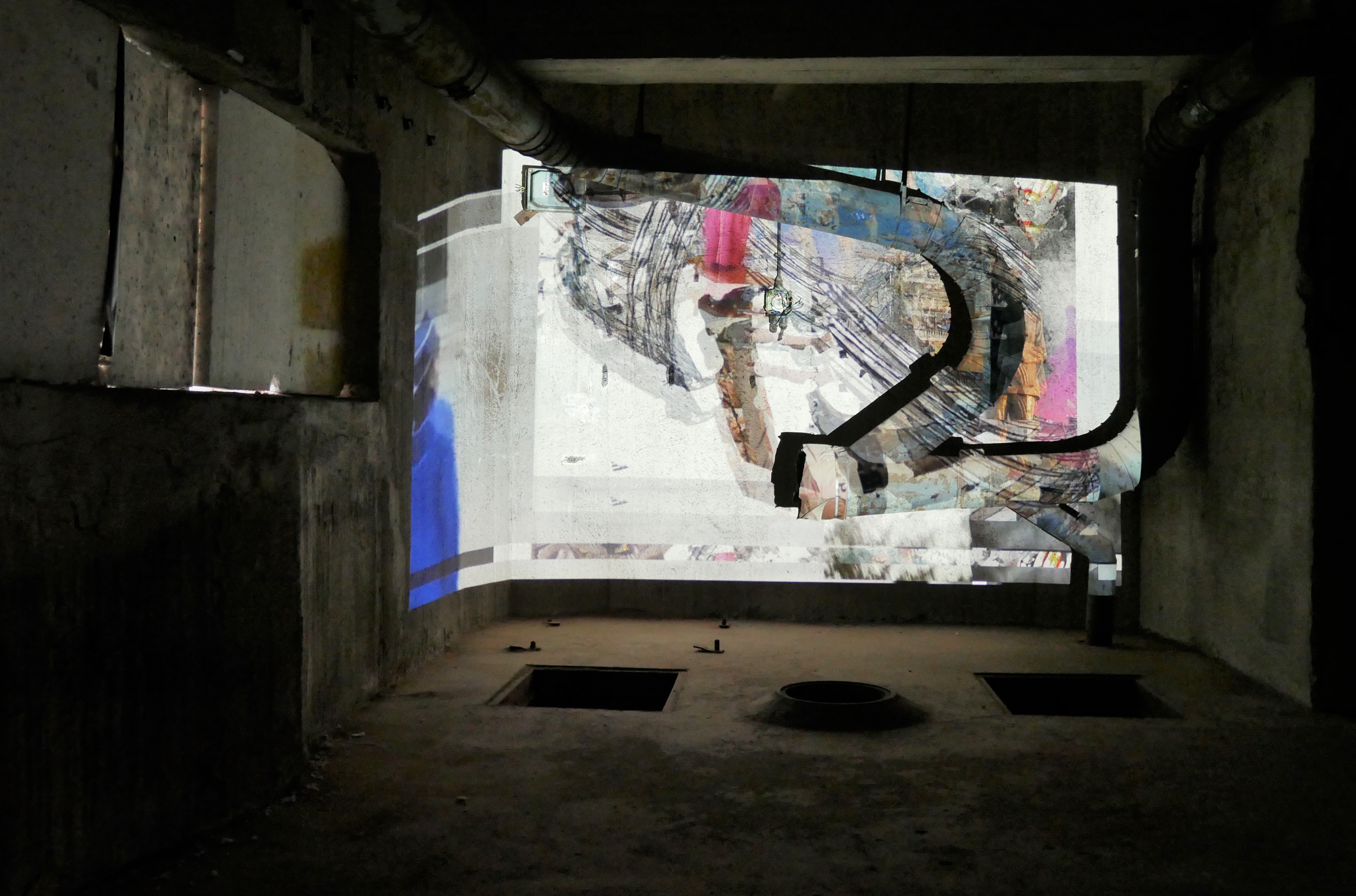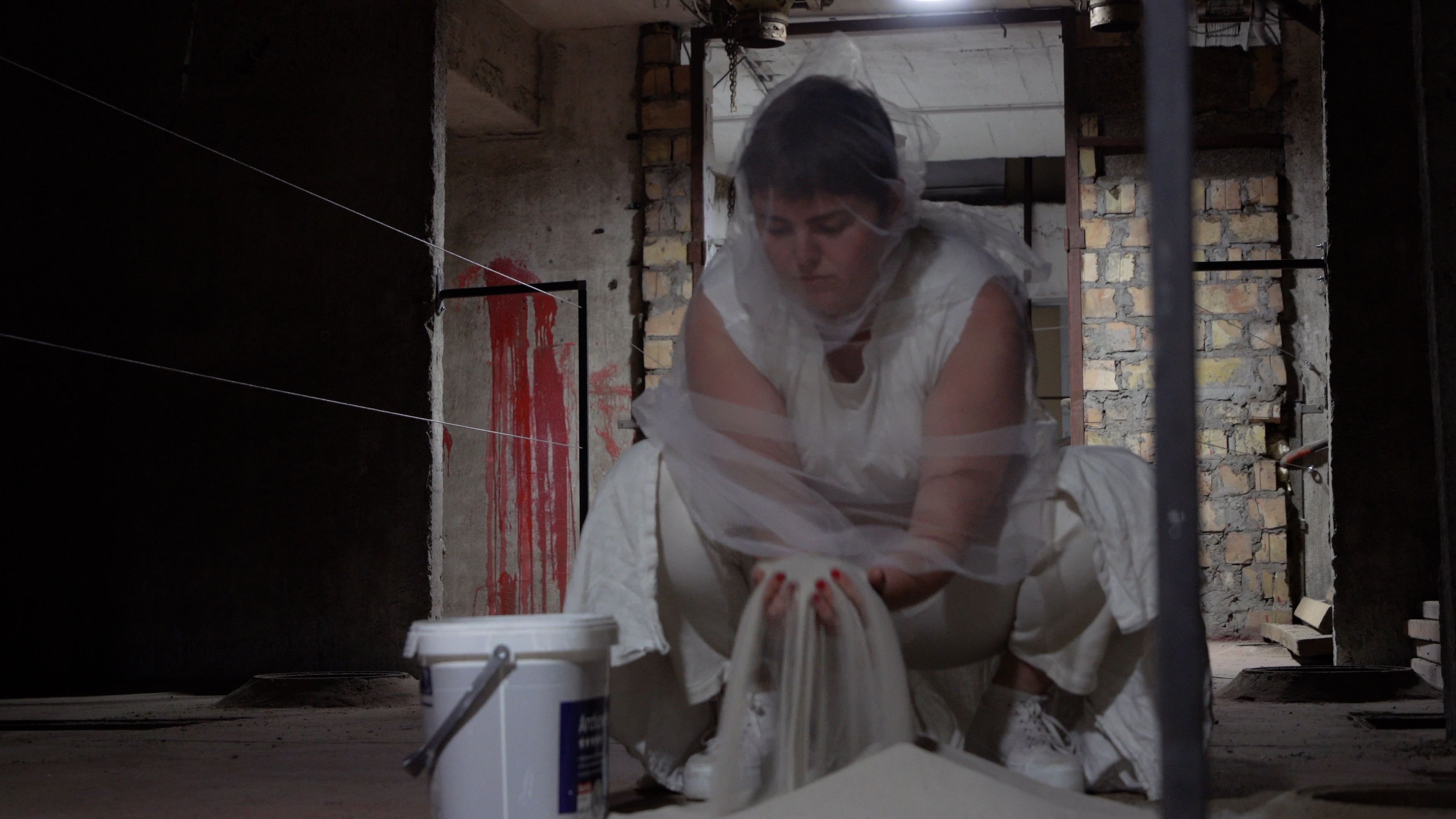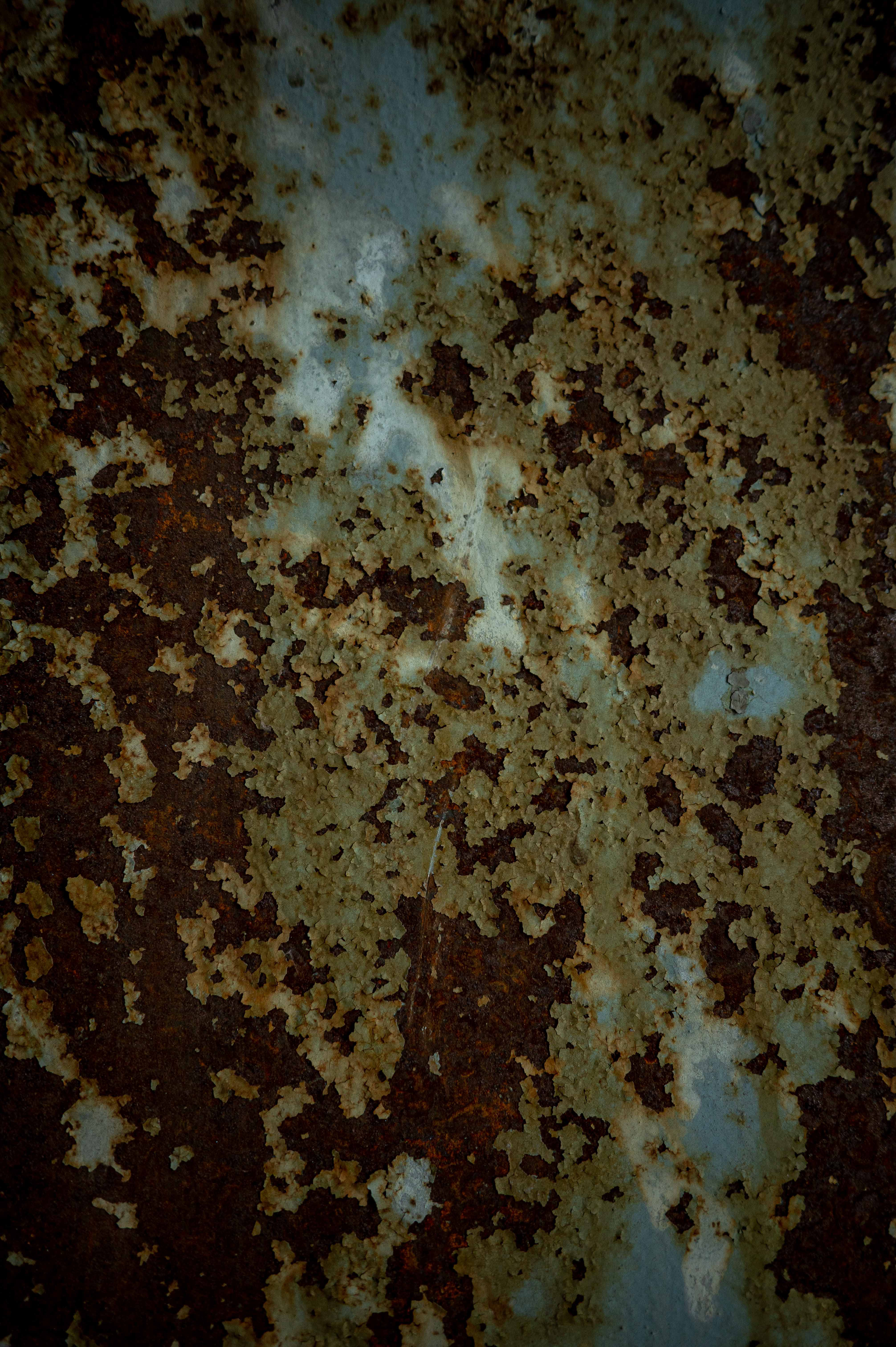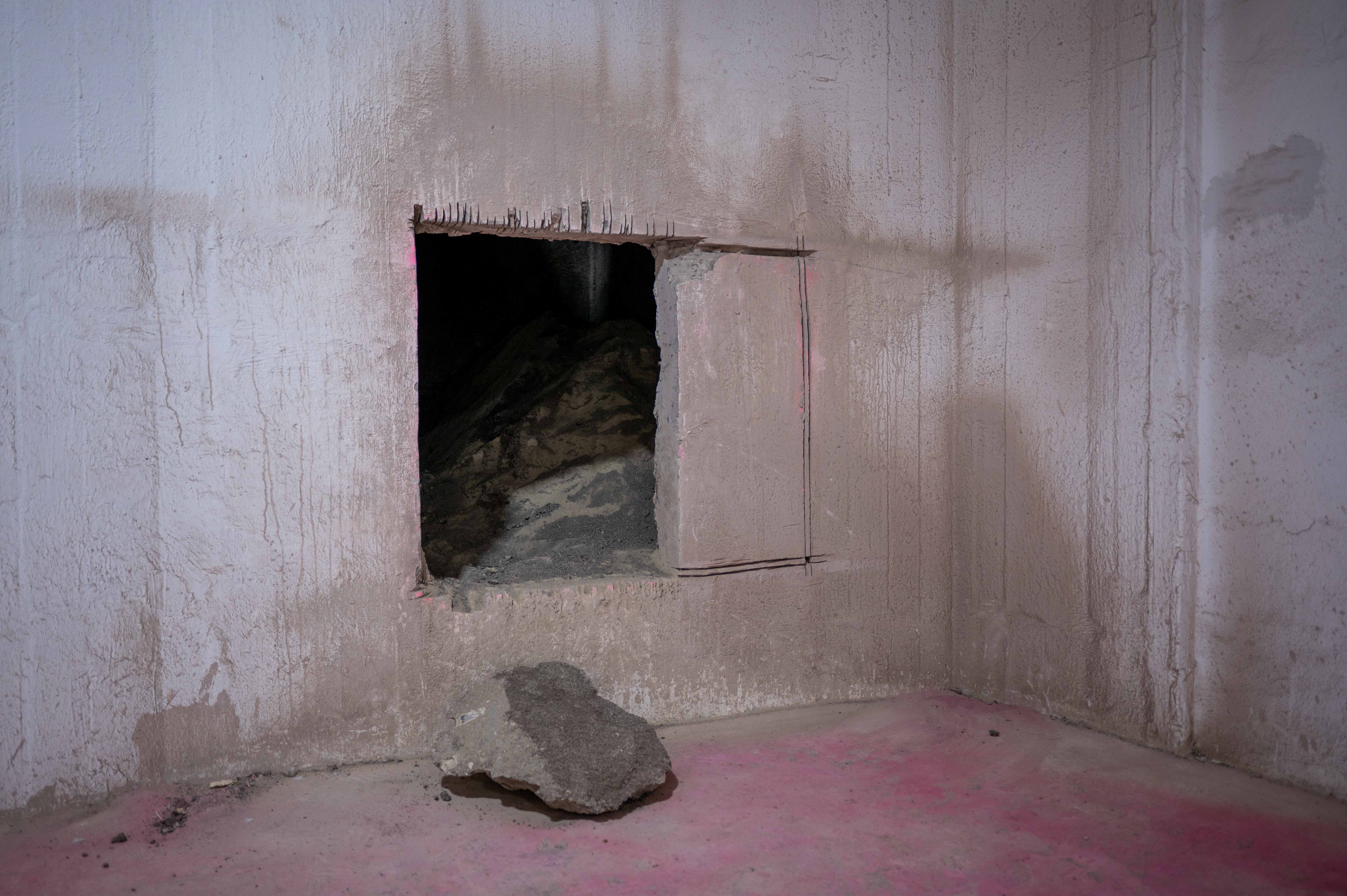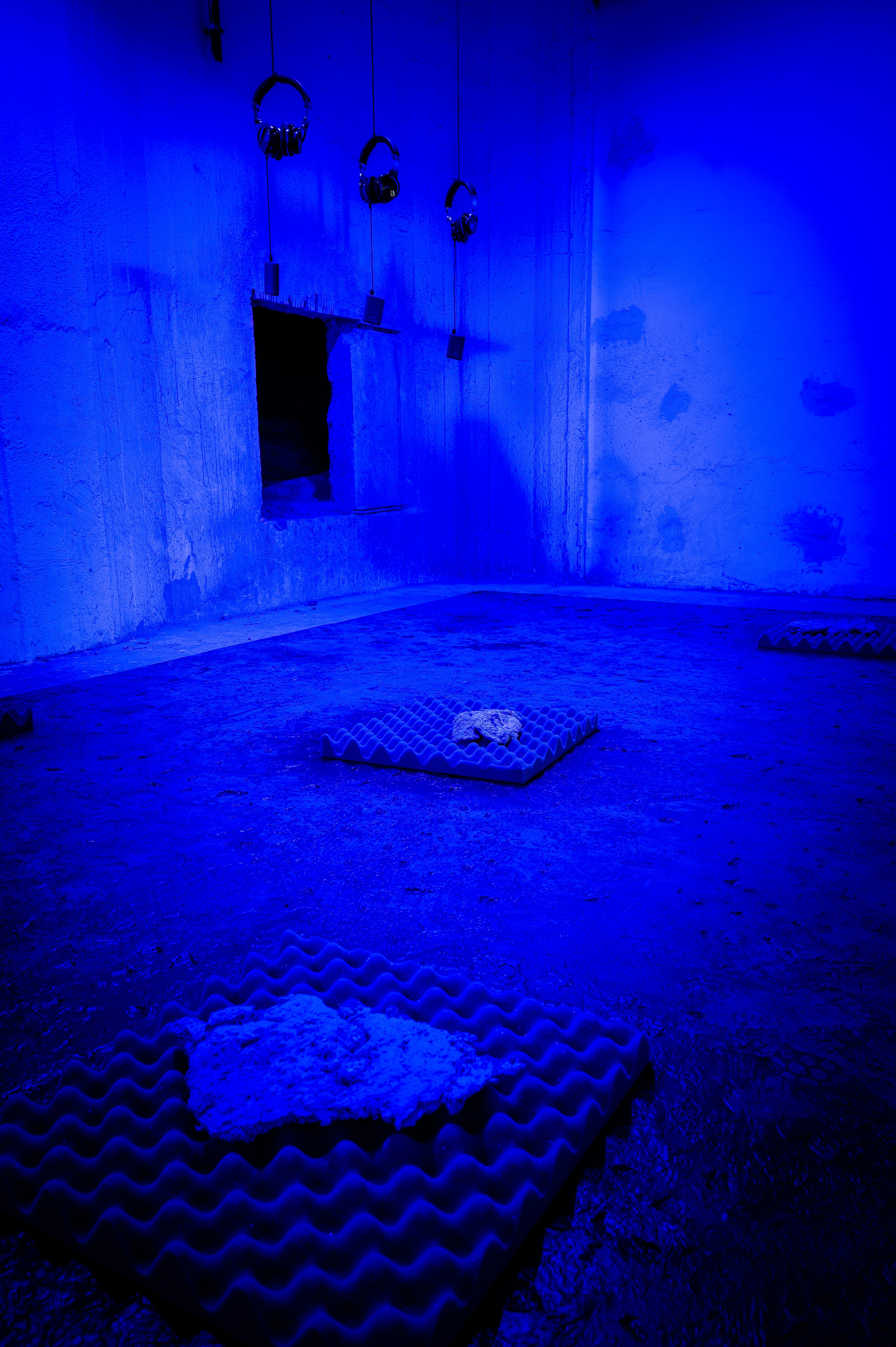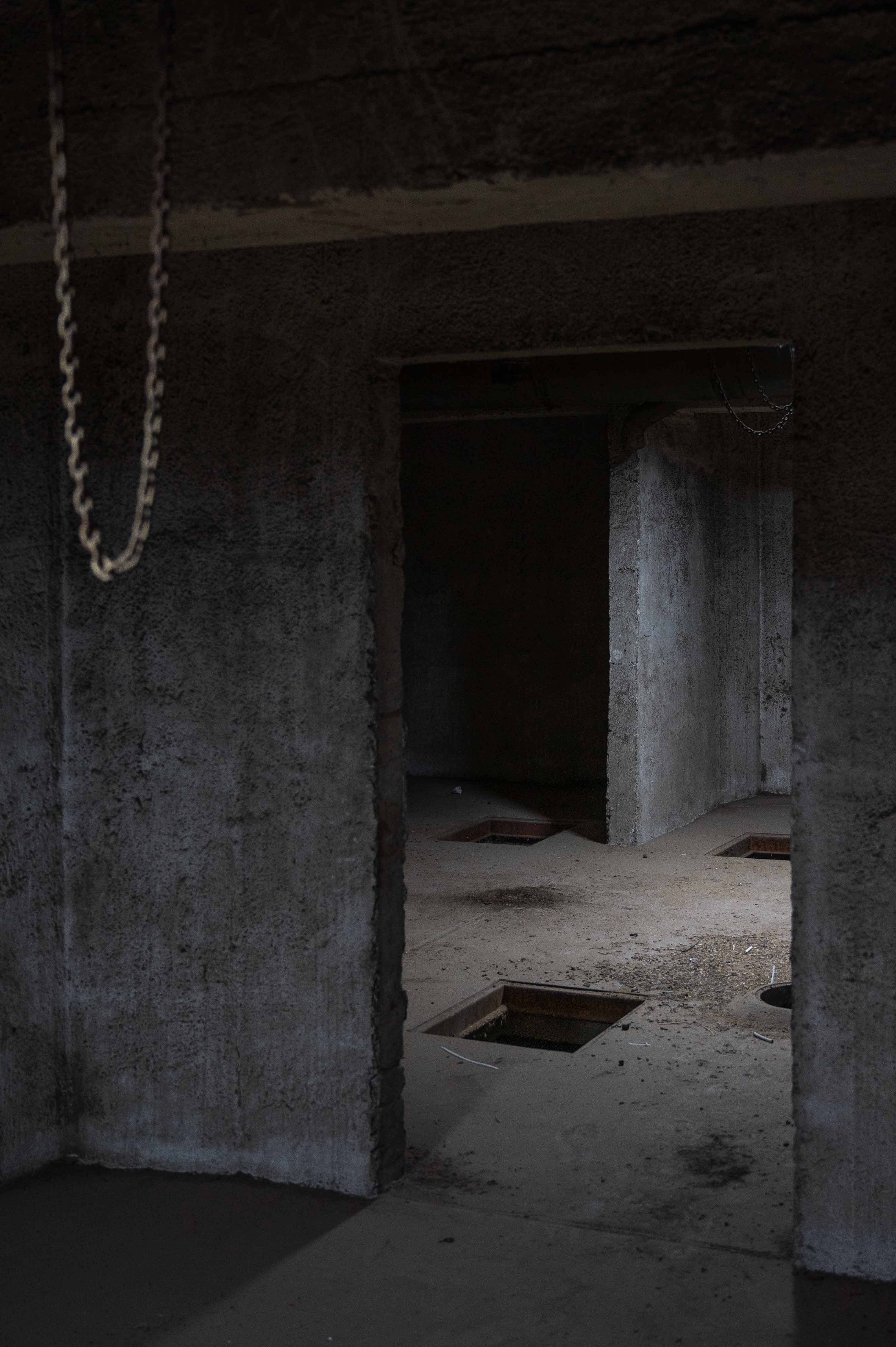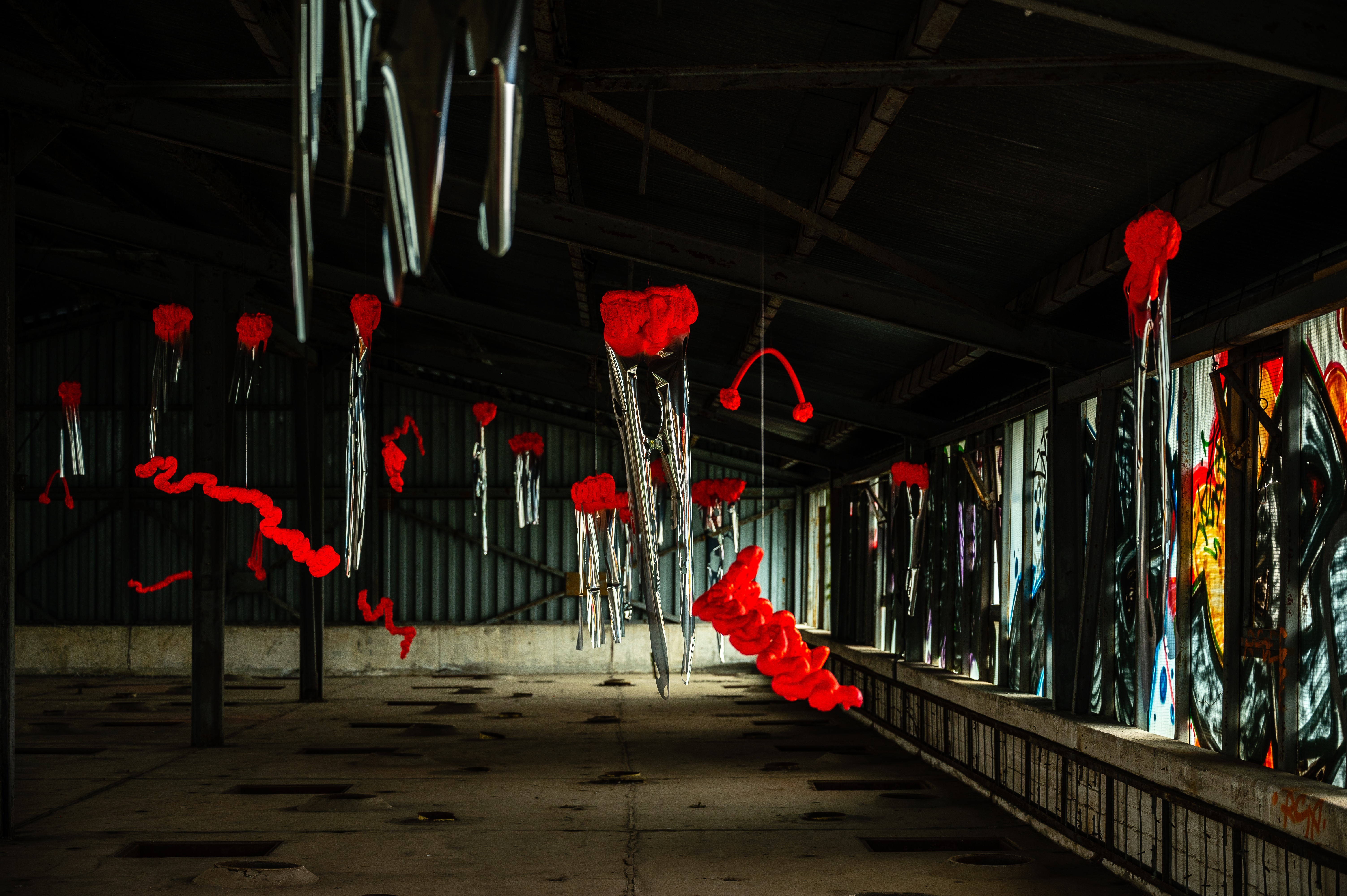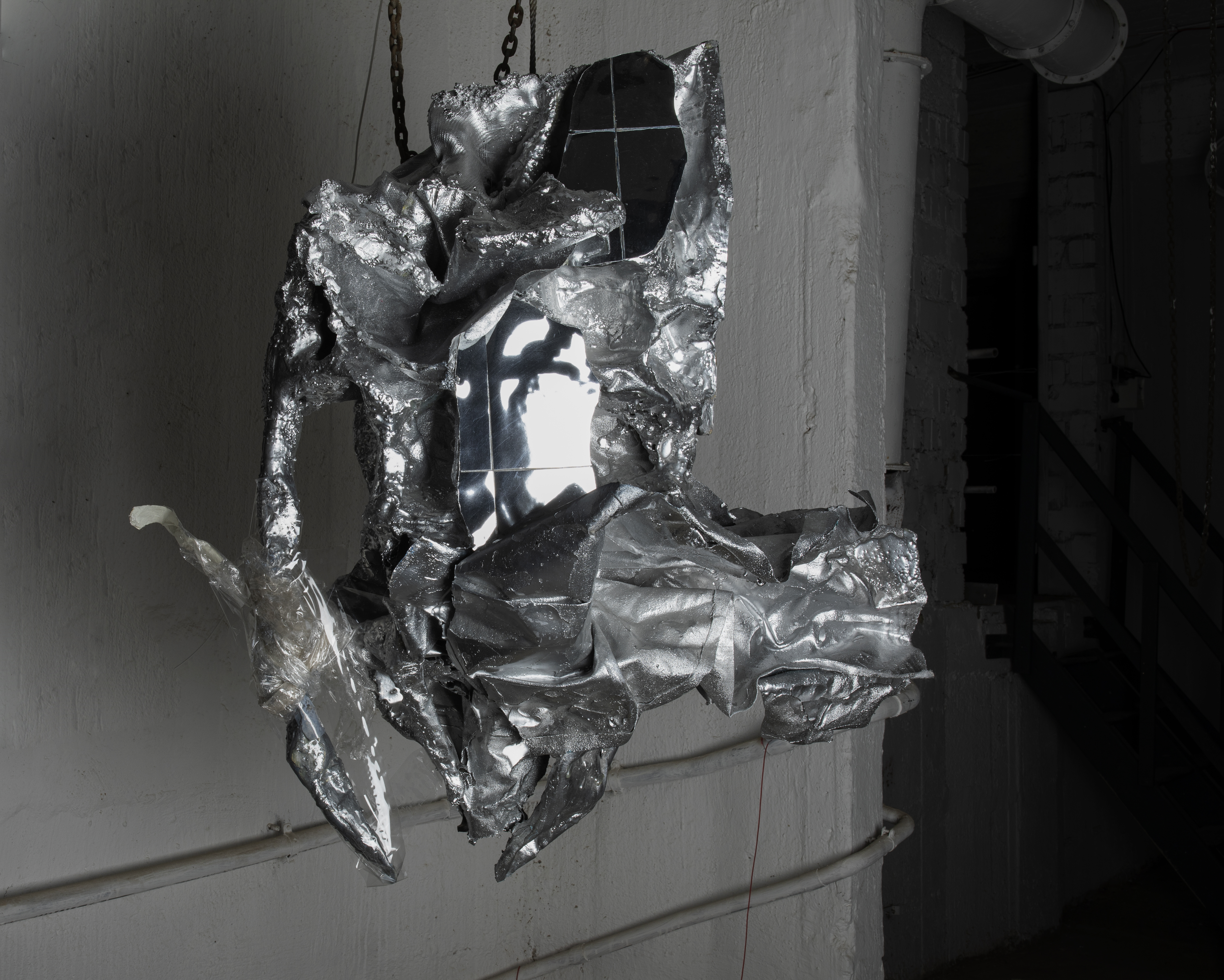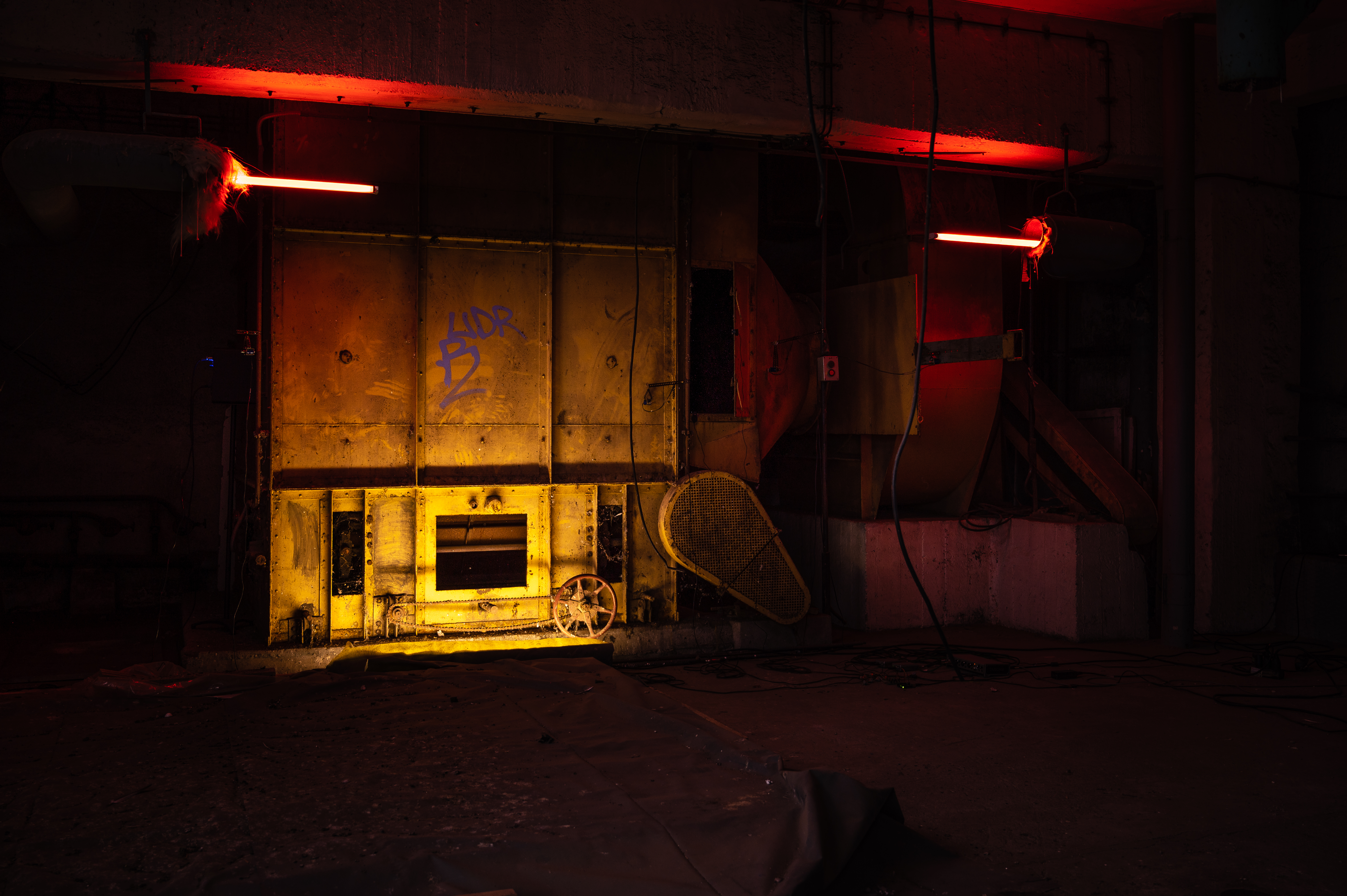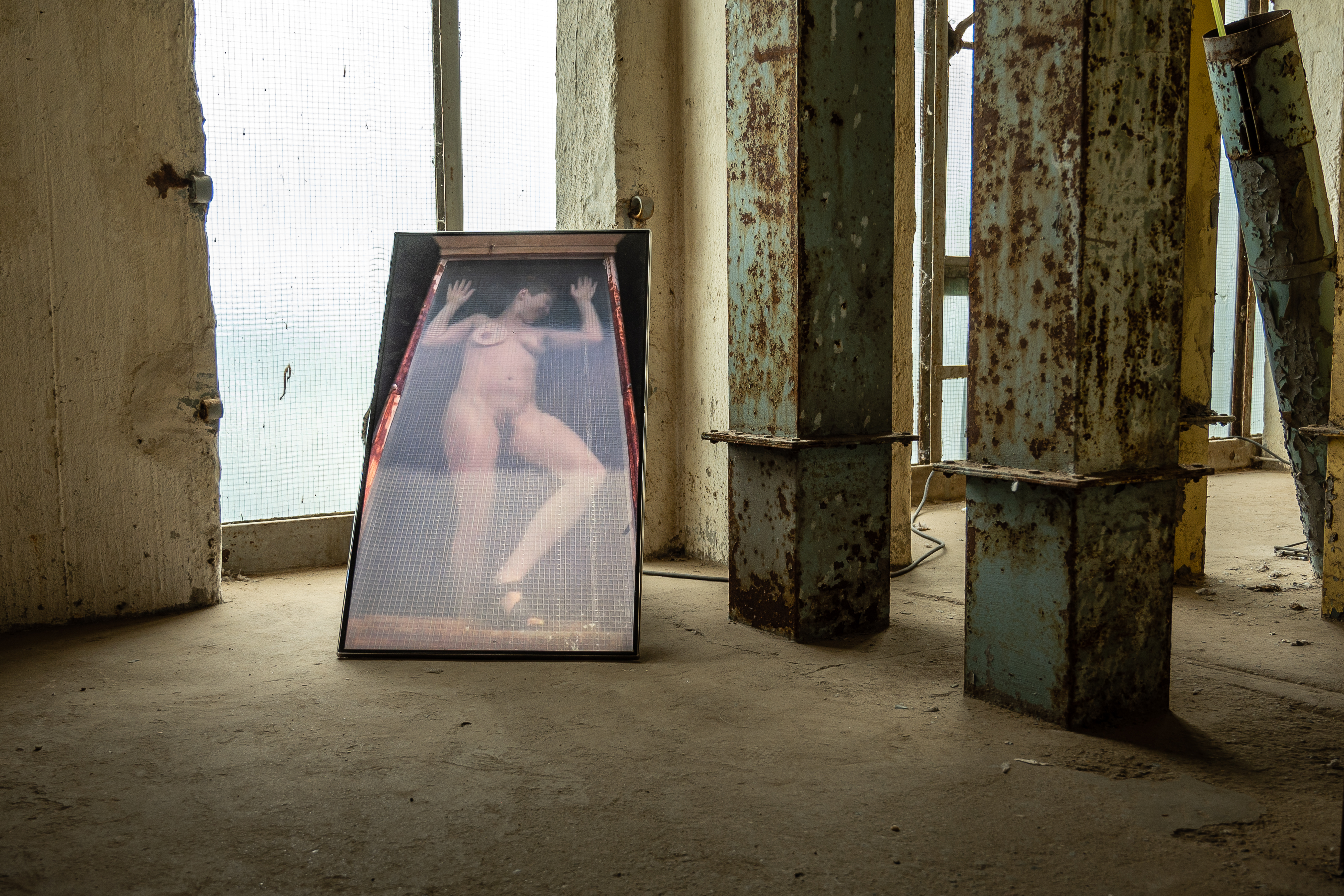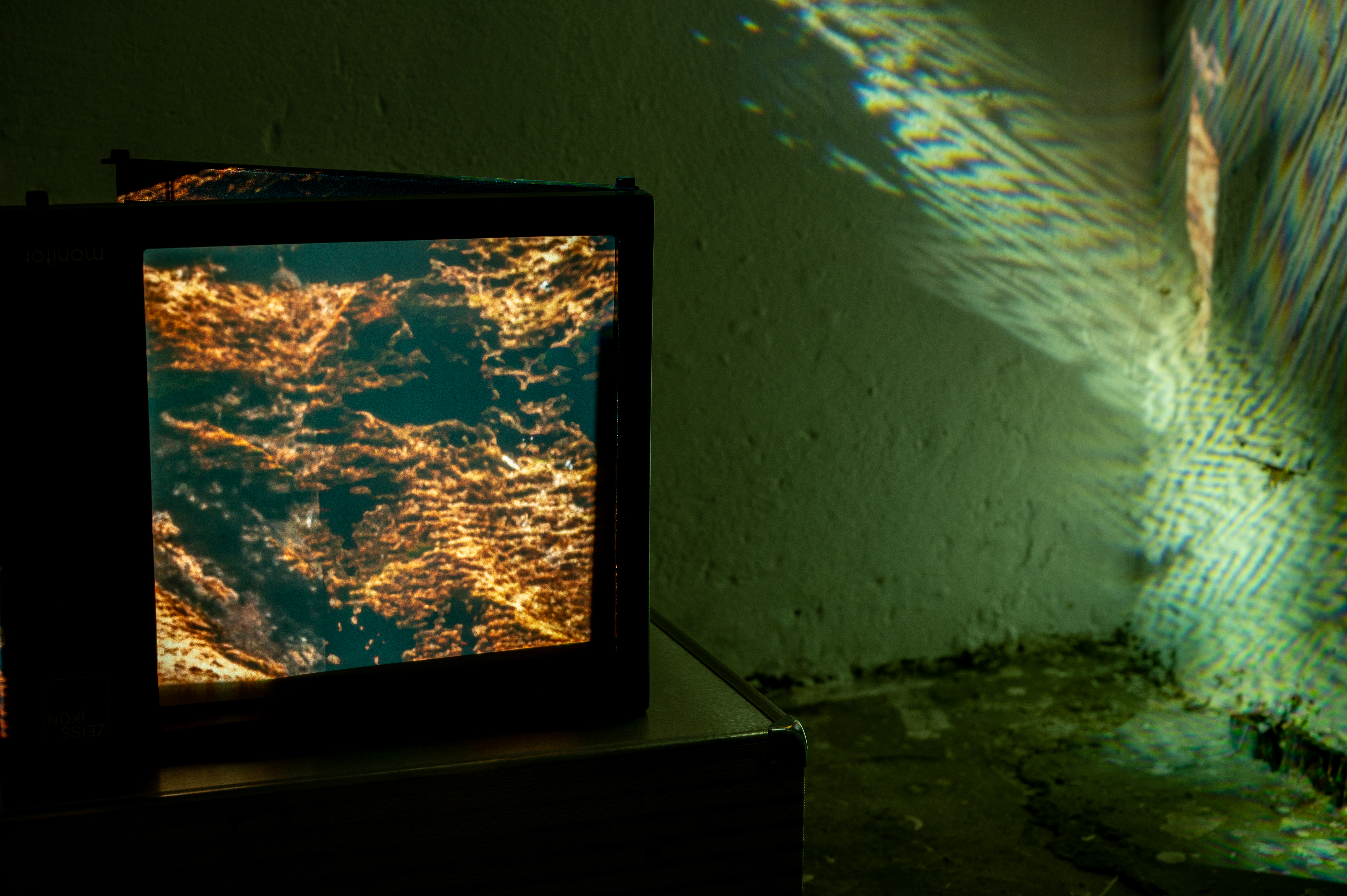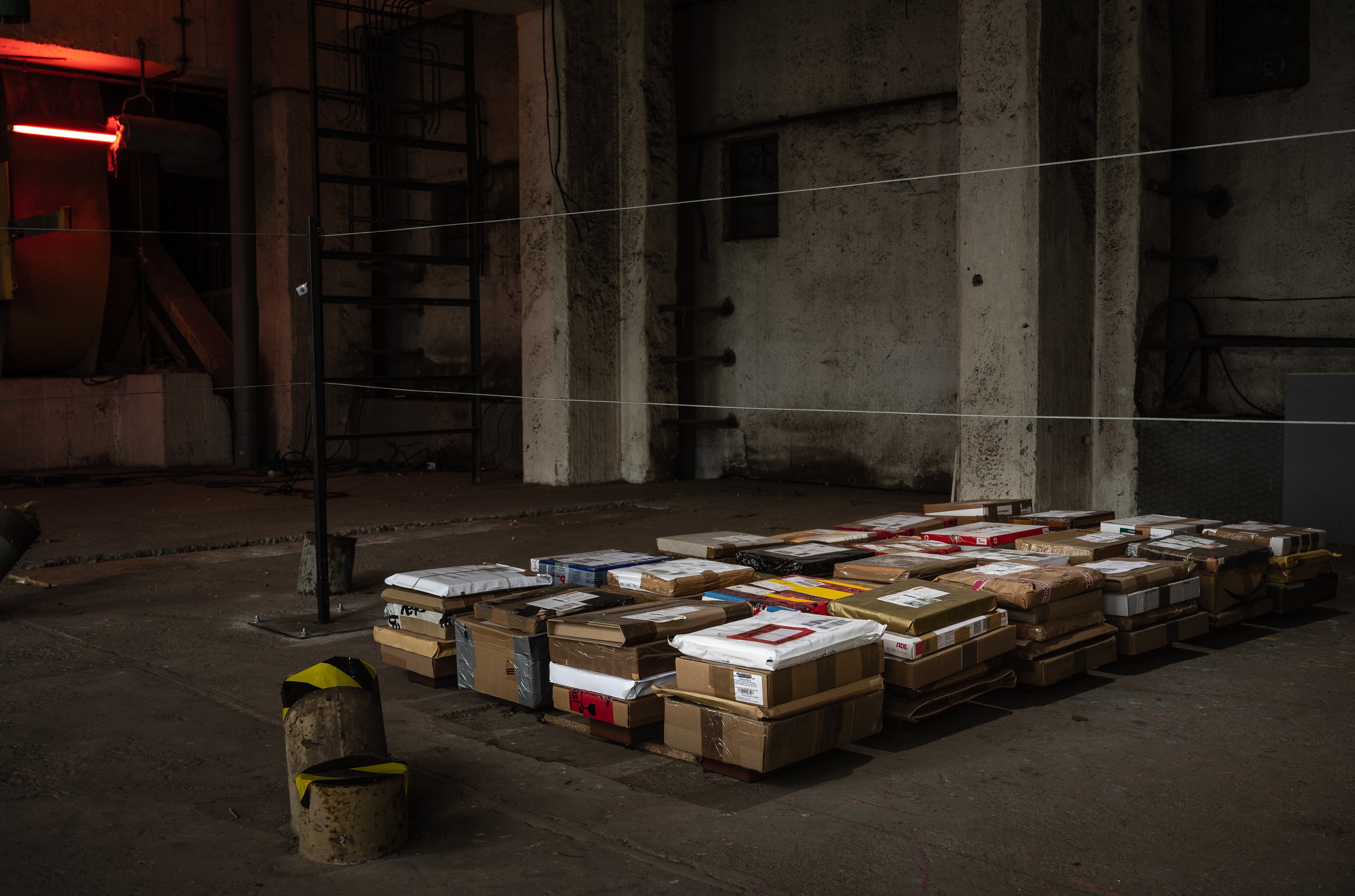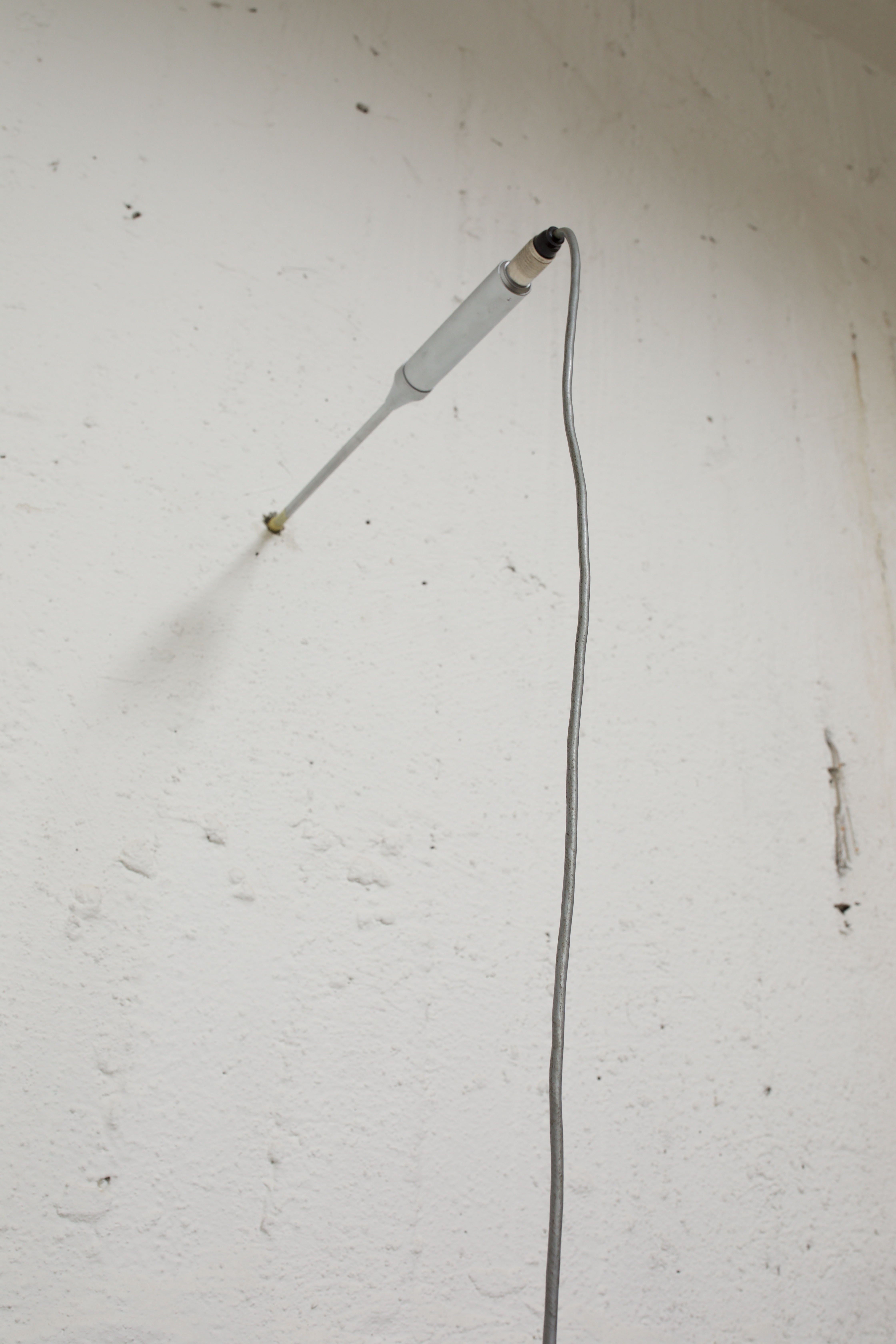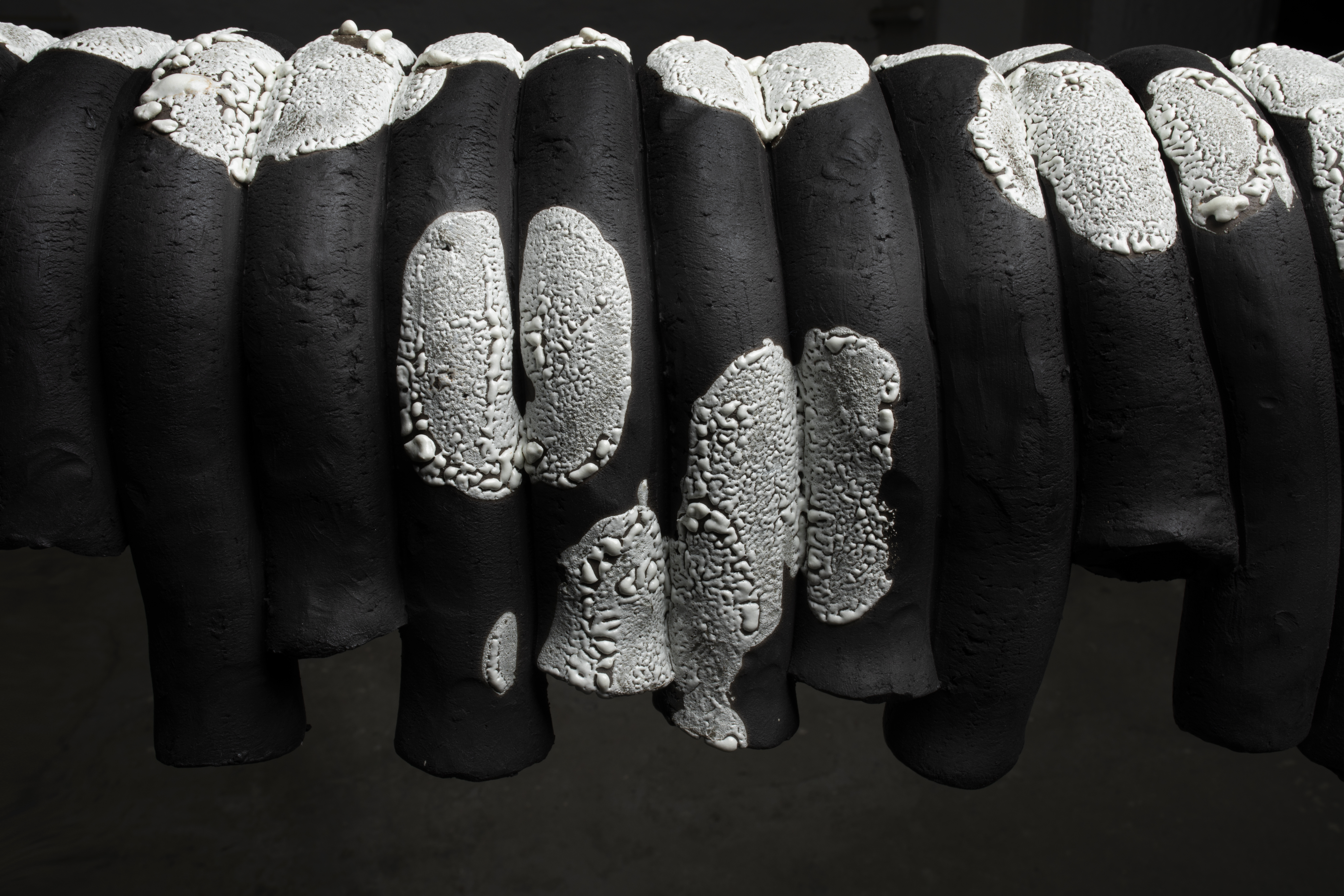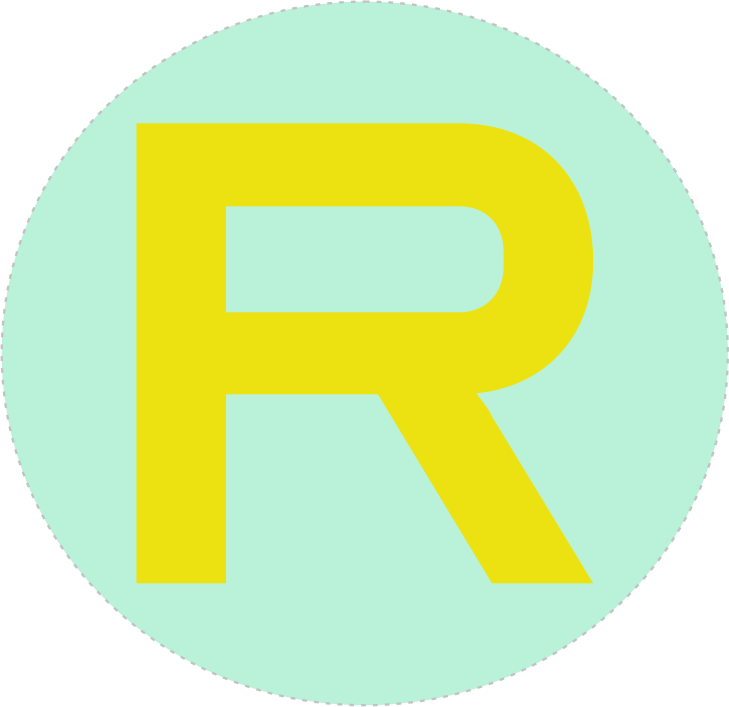eeefff
interviewed by commune collective
You started working together almost
a decade ago, could you briefly narrate
the history of your coming together?
Why did you decide to start working together?
→ Answered in-between changing places,
moving out, moving in, repeat ←
From one side, it feels like anew. Fresh
glimpse. Fresh catch. Full of unexpectedness.
Facts floating around. What if? How
come? Do you see? Am I the only one noticing?
On the other hand, we are very focused.
And this focus has held through time.
The focus is being formed by our different
backgrounds: One has a background
in computer science, engineering, cybernetics
and the other in writing narratives,
science-fiction scenarios. We both
have always been into collective practices,
open-ended situations. With others.
Together with. In cooperation with. Being
interdependent. And also how different
forms of collectivities can co-exist and
take something from each other. As well
as being dependent on today’s knowledge-
production.
We ask ourselves “how to start?”. The
question “Why?” is always retrospective.
“How?” is more about the quality of
time we spend together practicing, talking,
struggling, confronting and mixing
our ideas and experiments.
Modes of production of culture are in our
focus. Any type of a collective mirrors the
context from which its cultural materiality
is arising. So it’s a good point to reflect
on our own conditions. Production of
culture — reproduction of the collective.
And vice versa.
But why — We are both interested in interiors
and structures of different temporalities.
A collective is a good place to experiment
with them, to set our own rules.
Returning to the “open-ended character
of collective work” — yes, nobody knows
what will happen when you bring some
experiments into a collective. How could
it resonate? What kind of dissensus will
be born out of it? And how to deal/heal/
suspend/sustain this contradiction?
To sum up. Collective work is:
- Surprise
- Gift
- Has an interior and exterior
- Keeps secrets
- Gives basis to survive
- Playful with temporalities of
(re-)production
When you started working, what did you
imagine your collective/collaboration to
be? Did this vision relate to the name of
your collective? Did it change over the
years? If yes, how?
→ Edited in a library with a lot of books
brought by the visitors, self-organized,
mixed but not chaotic, where we left
some notes for the visiting friends who
will be here only after our leave, whom
we miss ←
eeefff exists in-between words
with invisible characters n o t
trying to narrativize themselves before
the material or before
the collective situation . It could be
a working name for wi-fi. A RGB-notation
of a color: #eeefff. A temporary name.
From the pincers of the government.
From a certain form. The uncertainty,
the question, the instability, the temporal
is what holds us together. And that is
what we share with others. Quickly assembled,
temporary community, fictional
connections that by their affect become
non-fictional. The collectivity as something
quickly assembled and disassembled.
Perhaps if you do not fetishise the
collectivity, it will not push you to end
it. If you perceive it every day as something
new. If we would have known the
exact outcome of the situations that we
make with other people, we would not
have bothered doing them. The interest
is precisely the impossibility to know in
advance.
Strong interest in certain topics, not directed
by a will of the contemporary art
world, but rather in order to insist on your
“obsessions” and to treat artistic spaces
tactically, as your interests could be not
“sustainable” and not “profitable” for
symbolic capital. We think our collective
for the first five years was seen as something
not comprehensible and not relevant,
but if you insist, stay within your
practices, after some years you find networks
that could be even stronger than
you thought.
A duo is a very specific form of collectivity
with its own set of challenges and
inner workings that sets it apart from
larger groups. Could you reflect on the
way you work together; how do you divide
labor between the two of you? How
fluid or fixed are your roles? What challenges
have you found to be most prominent?
→ Answered while sitting on a train, going
from a collective-running residency
PAF, where we spend time with Olia
Sosnovskaya and Aleksei Borisionok, our
dear friends and collaborators from Work
Hard! Play Hard! working group ←
Our work together is sometimes structured
according to our beloved schedule
(to love the schedule is a certain task,
right?):
Monday of archiving
Tuesday of tender speculations
Wednesday of projects’ affairs
Thursday of crazy sketches
Friday of your own
About dividing the labor. When we're in
the mode of experimenting and researching,
we bring each other gifts/surprises
from fields of our interest. When it comes
to formalization/finalizing we're trying
to support each other. When we have
no more time before the event, we usually
stick to the fastest way to do what
we know. In between, we are fluid and
try to change “what we know” or our predetermined
techniques, coming from our
backgrounds. A group is a place where we
can learn from each other. And it's important
to save time and energy for that.
To live and work together is the main
challenge, how do you know when is
what? We are writing our answers to the
questions in-between lines of schedules
with rest, work and partnership. How do
all these collectivities overlap? When do
we actually invent and create, the two of
us? Is the time of the smaller collectivity
eaten by adventures in bigger groups or
vice versa or is it just a big soup? Should
we agree on a certain protocol, on a certain
time? Will this time be productive?
Or will we come up with the next idea inbetween?
In-between cities, roads, changing
weathers, other collectivities? Isn’t
it always in-betweenness? And togetherness?
And work-play situations?
And of course it is a struggle for each others
healthy back posture when it comes
to work on the computer, in-between)))
Group activity is a place where we can
resist wide-spread extractivist land oppressive
logic of cultural production. Indeed
to struggle together is funnier!)
Going in a perpendicular direction saves
space for experiments. The question is
how not only to struggle/survive but to
flourish as well.
Your work is very diverse in methods but
it mostly centers our contemporary lives
and how tangled they are with the
digital space. Could you reflect on the
notion of (physical and digital) space as
it features in your work and in your collaboration?
→ Edited while our friends are at the
marketplace, leaving us to work, four of
us, self-organized residency in Marseille,
came here to rest and work, not knowing
in advance how exactly we will structure
it ←
We do not divide the space into physical
and digital, but rather work with their
overlaps, how they intersect and how they
are not separable. Instead of dividing,
we're focusing on the materialization of
computing abstractions. We are currently
exploring two vectors: Algorithms and
practices of solidarity and how these two
seemingly different realms can intertwine
and influence each other. First notion,
algorithms – they are deeply involved in
cultural, cognitive, creative and managerial
decision-making processes, have appeared
as part of the military complex,
but potentially can contribute to the
emergence of new - empowering - cultural
forms. Second notion, forms of solidarity
are closely related to historical
models of workers resistance, various types
of sabotage and disobedience, queer
temporalities and futurisms that may
lead to solidarity in such highly formalized
working regimes as digital labor. We are
looking closely into the interaction between
algorithms as a form of governance,
mathematical modeling, social imagination
from one side and the specific
implementation of algorithms in various
environments from cities to ones that are
very intimate. Our main focus is on actors
who form a landscape that includes
digital, economic, political dimensions.
We ask: What place can algorithmization
take in the conditions of the suspension
of the “normal” course of things? What
is the place of art, born out of, thanks to
or against the techno-political regimes of
collectivities and their breaks? What are
the socio-political effects of algorithmization?
What are new forms of cyborgised
communalization that can emerge?
We are making a series of distributed
collective experiments and situated experiences
that seek to answer these
questions, “The school of algorithmic solidarity”.
During one session, we learned
how to short the wires on the railroad
tracks; during another we explored different
methods how to collectively read
the programming code that relates to the
algorithms of extraction of profits from
workers' bodies, to the rise of colonialism
by the Russian Federation towards
neighboring communities either state or
stateless; during a third session we speculated-
through-playing about forms of
communities involved in occupying the
public media infrastructures. All these
sessions try to relate to the intersection
of oppressions: digital extraction, colonialism,
media surfaces that do not belong
to us.
From 2016 to 2020 we co-organised an
annual event Work Hard! Play Hard! with
the collective glossary written by a lot of
people involved in this initiative. We want
to quote sentence form a term “Dispersed
collectivity” written by our collaborator
Olia Sosnovskaya which we can relate
to:
“Instead of nostalgia for imaginary communities
there are dynamic links and
networks, the instability of our borders,
virtual collectivity. We act through copresence,
movement, text, attraction,
dissolution, podcast, pulsating intensity,
out of sight, slipping, viewing, takeover,
vnenakhodimost.”
Do you think of your work as emergent
specifically from a specific local context?
Or does your mode of work and
interests create experiences that can
reach beyond local contexts?
→ Answered in a mixture of contexts, locations,
waking up after deep sleeps,
knocked down schedules, midday readings,
disco balls, collective breakfasts,
struggling with one of the landlords that
evicted our friend, waiting while the clothes
are being washed ←
We ask: What is between local contexts?
Other localities? Some blurry transition
zone? Check point? Waiting room? Ruins
of some localities of the past?
Our position is, that despite a diffused
opinion, there is no such a thing like an
abstract global digital context. All the
seeming globality is mostly made up of
violent practices of coping desires of one
community in favor of the interest of others.
Our fascination is in different ways
how heterogeneity plays a role here:
- From what practices is the locality
made of?
- Who is in charge of making the locality
local?
- Can locality be global or should we
eventually use other words?
- How to be sensitive to the context?
For us it’s intriguing to see how local/concrete/
raw conditions are being abstracted
or inflated to the size of pervasive/global/
planetary. Here are the questions: How is
it organized? What is the temporality of
this process? How can you feel it, within
your body, is it possible at all?
When going to a certain location collectively,
we aim to interweave the actual
bodies and the algorithmic/logistical
infrastructures. Not being mediated by
any intermediary, we “can feel these processes
on our skin” and these processes
are very material, non-spectacular, you
are no longer afraid or you are no longer
being in your dark fantasies.
Here is a quote from our 2016 essay:
“We sat near the data center, picnicking,
thawing and basking. There were some
who knew each other only virtually, some
finding out about the picnic through
friends and, all, while walking to us, were
like cats on hot bricks – what if a crackdown
happens again? As it turned out,
the intestines of the data center were the
safest place to be.”
So we try to find gray zones, certain gaps
in the city where the existing order is not
yet established. And it is possible to make
a public space out of the parking place
of a data center or a forum at the backdrop
of an existing railway infrastructure
(of course here we should keep in mind
different regulations and particularities
of specific territories).
We are not that interested in how infrastructures
are presented in the media,
rather we want to get rid of our own
prejudices or predetermined visions that
are dominant. That is why quite often we
do not use spectacular images, we do
not want to contribute to a technocratic
solutionism or digital sublime of any
type. At the ground, at the very concrete
spot, we rather look for unpolishedness,
digital materiality, we call it a “meat” of
the infrastructures. And concrete power
relations. It is crucial for us to find concrete
agents, workers, caretakers, those
who most often stay behindbeyond the
discussions about the materiality of the
digital. Those who decide how it will operate,
run, function, deliver, monitor, govern,
maintain, those who are spending
time in a smoking room, who go to a sauna
to talk about their processes. Ideally
a certain location becomes a temporary
forum for participants.
interviewed by commune collective
You started working together almost
a decade ago, could you briefly narrate
the history of your coming together?
Why did you decide to start working together?
→ Answered in-between changing places,
moving out, moving in, repeat ←
From one side, it feels like anew. Fresh
glimpse. Fresh catch. Full of unexpectedness.
Facts floating around. What if? How
come? Do you see? Am I the only one noticing?
On the other hand, we are very focused.
And this focus has held through time.
The focus is being formed by our different
backgrounds: One has a background
in computer science, engineering, cybernetics
and the other in writing narratives,
science-fiction scenarios. We both
have always been into collective practices,
open-ended situations. With others.
Together with. In cooperation with. Being
interdependent. And also how different
forms of collectivities can co-exist and
take something from each other. As well
as being dependent on today’s knowledge-
production.
We ask ourselves “how to start?”. The
question “Why?” is always retrospective.
“How?” is more about the quality of
time we spend together practicing, talking,
struggling, confronting and mixing
our ideas and experiments.
Modes of production of culture are in our
focus. Any type of a collective mirrors the
context from which its cultural materiality
is arising. So it’s a good point to reflect
on our own conditions. Production of
culture — reproduction of the collective.
And vice versa.
But why — We are both interested in interiors
and structures of different temporalities.
A collective is a good place to experiment
with them, to set our own rules.
Returning to the “open-ended character
of collective work” — yes, nobody knows
what will happen when you bring some
experiments into a collective. How could
it resonate? What kind of dissensus will
be born out of it? And how to deal/heal/
suspend/sustain this contradiction?
To sum up. Collective work is:
- Surprise
- Gift
- Has an interior and exterior
- Keeps secrets
- Gives basis to survive
- Playful with temporalities of
(re-)production
When you started working, what did you
imagine your collective/collaboration to
be? Did this vision relate to the name of
your collective? Did it change over the
years? If yes, how?
→ Edited in a library with a lot of books
brought by the visitors, self-organized,
mixed but not chaotic, where we left
some notes for the visiting friends who
will be here only after our leave, whom
we miss ←
eeefff exists in-between words
with invisible characters n o t
trying to narrativize themselves before
the material or before
the collective situation . It could be
a working name for wi-fi. A RGB-notation
of a color: #eeefff. A temporary name.
From the pincers of the government.
From a certain form. The uncertainty,
the question, the instability, the temporal
is what holds us together. And that is
what we share with others. Quickly assembled,
temporary community, fictional
connections that by their affect become
non-fictional. The collectivity as something
quickly assembled and disassembled.
Perhaps if you do not fetishise the
collectivity, it will not push you to end
it. If you perceive it every day as something
new. If we would have known the
exact outcome of the situations that we
make with other people, we would not
have bothered doing them. The interest
is precisely the impossibility to know in
advance.
Strong interest in certain topics, not directed
by a will of the contemporary art
world, but rather in order to insist on your
“obsessions” and to treat artistic spaces
tactically, as your interests could be not
“sustainable” and not “profitable” for
symbolic capital. We think our collective
for the first five years was seen as something
not comprehensible and not relevant,
but if you insist, stay within your
practices, after some years you find networks
that could be even stronger than
you thought.
A duo is a very specific form of collectivity
with its own set of challenges and
inner workings that sets it apart from
larger groups. Could you reflect on the
way you work together; how do you divide
labor between the two of you? How
fluid or fixed are your roles? What challenges
have you found to be most prominent?
→ Answered while sitting on a train, going
from a collective-running residency
PAF, where we spend time with Olia
Sosnovskaya and Aleksei Borisionok, our
dear friends and collaborators from Work
Hard! Play Hard! working group ←
Our work together is sometimes structured
according to our beloved schedule
(to love the schedule is a certain task,
right?):
Monday of archiving
Tuesday of tender speculations
Wednesday of projects’ affairs
Thursday of crazy sketches
Friday of your own
About dividing the labor. When we're in
the mode of experimenting and researching,
we bring each other gifts/surprises
from fields of our interest. When it comes
to formalization/finalizing we're trying
to support each other. When we have
no more time before the event, we usually
stick to the fastest way to do what
we know. In between, we are fluid and
try to change “what we know” or our predetermined
techniques, coming from our
backgrounds. A group is a place where we
can learn from each other. And it's important
to save time and energy for that.
To live and work together is the main
challenge, how do you know when is
what? We are writing our answers to the
questions in-between lines of schedules
with rest, work and partnership. How do
all these collectivities overlap? When do
we actually invent and create, the two of
us? Is the time of the smaller collectivity
eaten by adventures in bigger groups or
vice versa or is it just a big soup? Should
we agree on a certain protocol, on a certain
time? Will this time be productive?
Or will we come up with the next idea inbetween?
In-between cities, roads, changing
weathers, other collectivities? Isn’t
it always in-betweenness? And togetherness?
And work-play situations?
And of course it is a struggle for each others
healthy back posture when it comes
to work on the computer, in-between)))
Group activity is a place where we can
resist wide-spread extractivist land oppressive
logic of cultural production. Indeed
to struggle together is funnier!)
Going in a perpendicular direction saves
space for experiments. The question is
how not only to struggle/survive but to
flourish as well.
Your work is very diverse in methods but
it mostly centers our contemporary lives
and how tangled they are with the
digital space. Could you reflect on the
notion of (physical and digital) space as
it features in your work and in your collaboration?
→ Edited while our friends are at the
marketplace, leaving us to work, four of
us, self-organized residency in Marseille,
came here to rest and work, not knowing
in advance how exactly we will structure
it ←
We do not divide the space into physical
and digital, but rather work with their
overlaps, how they intersect and how they
are not separable. Instead of dividing,
we're focusing on the materialization of
computing abstractions. We are currently
exploring two vectors: Algorithms and
practices of solidarity and how these two
seemingly different realms can intertwine
and influence each other. First notion,
algorithms – they are deeply involved in
cultural, cognitive, creative and managerial
decision-making processes, have appeared
as part of the military complex,
but potentially can contribute to the
emergence of new - empowering - cultural
forms. Second notion, forms of solidarity
are closely related to historical
models of workers resistance, various types
of sabotage and disobedience, queer
temporalities and futurisms that may
lead to solidarity in such highly formalized
working regimes as digital labor. We are
looking closely into the interaction between
algorithms as a form of governance,
mathematical modeling, social imagination
from one side and the specific
implementation of algorithms in various
environments from cities to ones that are
very intimate. Our main focus is on actors
who form a landscape that includes
digital, economic, political dimensions.
We ask: What place can algorithmization
take in the conditions of the suspension
of the “normal” course of things? What
is the place of art, born out of, thanks to
or against the techno-political regimes of
collectivities and their breaks? What are
the socio-political effects of algorithmization?
What are new forms of cyborgised
communalization that can emerge?
We are making a series of distributed
collective experiments and situated experiences
that seek to answer these
questions, “The school of algorithmic solidarity”.
During one session, we learned
how to short the wires on the railroad
tracks; during another we explored different
methods how to collectively read
the programming code that relates to the
algorithms of extraction of profits from
workers' bodies, to the rise of colonialism
by the Russian Federation towards
neighboring communities either state or
stateless; during a third session we speculated-
through-playing about forms of
communities involved in occupying the
public media infrastructures. All these
sessions try to relate to the intersection
of oppressions: digital extraction, colonialism,
media surfaces that do not belong
to us.
From 2016 to 2020 we co-organised an
annual event Work Hard! Play Hard! with
the collective glossary written by a lot of
people involved in this initiative. We want
to quote sentence form a term “Dispersed
collectivity” written by our collaborator
Olia Sosnovskaya which we can relate
to:
“Instead of nostalgia for imaginary communities
there are dynamic links and
networks, the instability of our borders,
virtual collectivity. We act through copresence,
movement, text, attraction,
dissolution, podcast, pulsating intensity,
out of sight, slipping, viewing, takeover,
vnenakhodimost.”
Do you think of your work as emergent
specifically from a specific local context?
Or does your mode of work and
interests create experiences that can
reach beyond local contexts?
→ Answered in a mixture of contexts, locations,
waking up after deep sleeps,
knocked down schedules, midday readings,
disco balls, collective breakfasts,
struggling with one of the landlords that
evicted our friend, waiting while the clothes
are being washed ←
We ask: What is between local contexts?
Other localities? Some blurry transition
zone? Check point? Waiting room? Ruins
of some localities of the past?
Our position is, that despite a diffused
opinion, there is no such a thing like an
abstract global digital context. All the
seeming globality is mostly made up of
violent practices of coping desires of one
community in favor of the interest of others.
Our fascination is in different ways
how heterogeneity plays a role here:
- From what practices is the locality
made of?
- Who is in charge of making the locality
local?
- Can locality be global or should we
eventually use other words?
- How to be sensitive to the context?
For us it’s intriguing to see how local/concrete/
raw conditions are being abstracted
or inflated to the size of pervasive/global/
planetary. Here are the questions: How is
it organized? What is the temporality of
this process? How can you feel it, within
your body, is it possible at all?
When going to a certain location collectively,
we aim to interweave the actual
bodies and the algorithmic/logistical
infrastructures. Not being mediated by
any intermediary, we “can feel these processes
on our skin” and these processes
are very material, non-spectacular, you
are no longer afraid or you are no longer
being in your dark fantasies.
Here is a quote from our 2016 essay:
“We sat near the data center, picnicking,
thawing and basking. There were some
who knew each other only virtually, some
finding out about the picnic through
friends and, all, while walking to us, were
like cats on hot bricks – what if a crackdown
happens again? As it turned out,
the intestines of the data center were the
safest place to be.”
So we try to find gray zones, certain gaps
in the city where the existing order is not
yet established. And it is possible to make
a public space out of the parking place
of a data center or a forum at the backdrop
of an existing railway infrastructure
(of course here we should keep in mind
different regulations and particularities
of specific territories).
We are not that interested in how infrastructures
are presented in the media,
rather we want to get rid of our own
prejudices or predetermined visions that
are dominant. That is why quite often we
do not use spectacular images, we do
not want to contribute to a technocratic
solutionism or digital sublime of any
type. At the ground, at the very concrete
spot, we rather look for unpolishedness,
digital materiality, we call it a “meat” of
the infrastructures. And concrete power
relations. It is crucial for us to find concrete
agents, workers, caretakers, those
who most often stay behindbeyond the
discussions about the materiality of the
digital. Those who decide how it will operate,
run, function, deliver, monitor, govern,
maintain, those who are spending
time in a smoking room, who go to a sauna
to talk about their processes. Ideally
a certain location becomes a temporary
forum for participants.
speichern kollektivität - die kunst viele zu sein 01.-23.09.23 — speichern kollektivität - die kunst viele zu sein 01.-23.09.23 — speichern kollektivität - die kunst viele zu sein 01.-23.09.23
